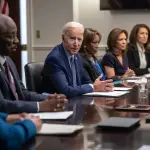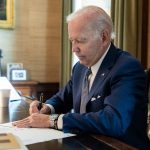Senator J.D. Vance has tossed a curveball into the ongoing narrative surrounding the latest U.S.-Russia prisoner swap. He suggested that the Kremlin’s willingness to release American hostages is fueled by a clear fear of a potential second Trump administration. It seems the bad guys across the globe are quaking in their boots, and for a good reason—they might just find themselves dealing with a leader who knows a thing or two about strength and negotiations.
Vance, discussing the release of notable prisoners such as Wall Street Journal reporter Evan Gershkovich and former Marine Paul Whelan, pointed out that it’s about time these Americans came home. After all, being imprisoned in Russia was utterly ridiculous in the first place. The real kicker? Vance believes that the decision to swap prisoners wasn’t born out of goodwill but rather a strategic move by Russia, recognizing the political landscape might soon tilt back to Trump’s favor. Could it be that authoritarian regimes are starting to realize that a strong America under Trump isn’t something they want to mess with?
Vance credits prisoner releases as ‘a testament to Trump’s strength’ https://t.co/TsFOjnQTYN via @dcexaminer
— 🌴PalmTreePatriot🌴 (@FLMomNYGirl) August 2, 2024
The prisoner swap, marking the first agreement of its kind since the much-publicized Brittney Griner deal, has raised eyebrows and questions. It involved the exchange of prisoners from various nations—U.S., Germany, Poland, and others—showcasing a sort of international yard sale of undesirable individuals. President Biden undoubtedly pounced on the opportunity to flaunt alliances, insisting that teamwork made the dream work when it comes to hostage situations. His take? Friends are crucial in the chaotic world stage, which sounds reassuring unless one recalls his own questionable international dealings.
While Biden was busy praising the virtues of international camaraderie, Trump didn’t hold back on his critique of the entire swapping charade. Calling it “extortion,” he called for transparency on the specifics of the deal, quite naturally pointing out that these negotiations never seem to yield the upper hand for the United States. Who could argue against the man who has single-handedly managed to retrieve hostages without giving anything away? The mere thought of America playing the role of sucker in these transactions is enough to make any patriotic soul cringe.
Essentially, this situation illustrates a stark contrast between two leadership styles. On one hand, Biden seems to operate under the illusion that diplomacy and allies will secure peace, while Trump advocates for strength and a no-nonsense approach to negotiations. The rhetoric around this swap exemplifies the evolving dynamics in foreign affairs. While the left beams about strategic partnerships, the right raises eyebrows and questions about whether America is truly coming out ahead. If fear is indeed guiding Russia’s hand, maybe it’s time to reconsider who exudes the real authority on the global stage.




